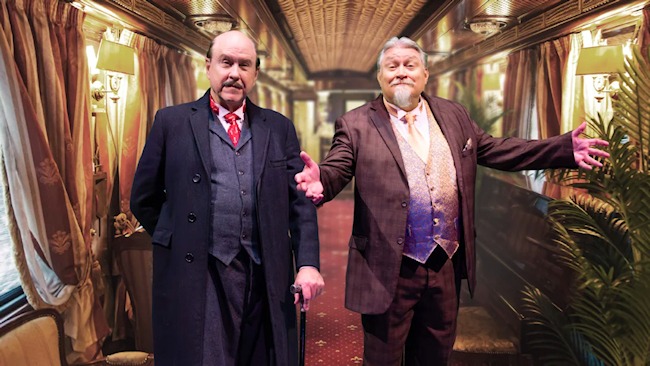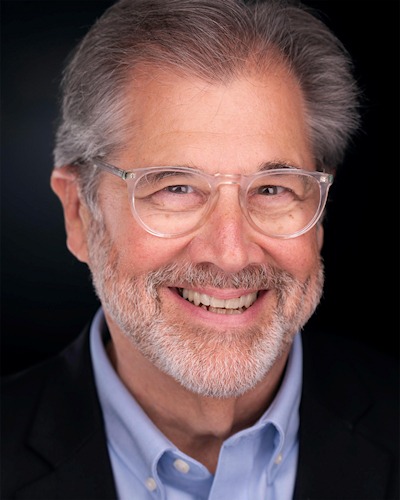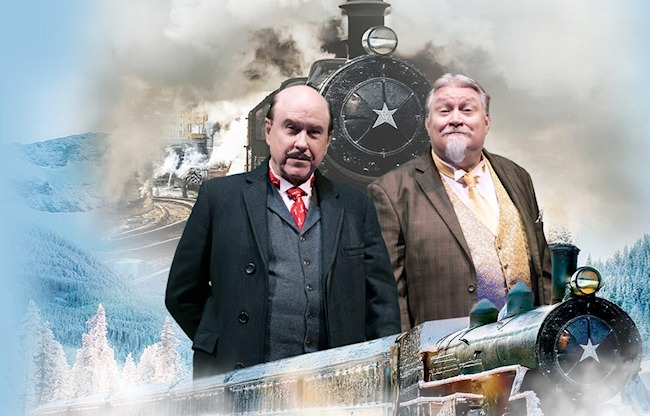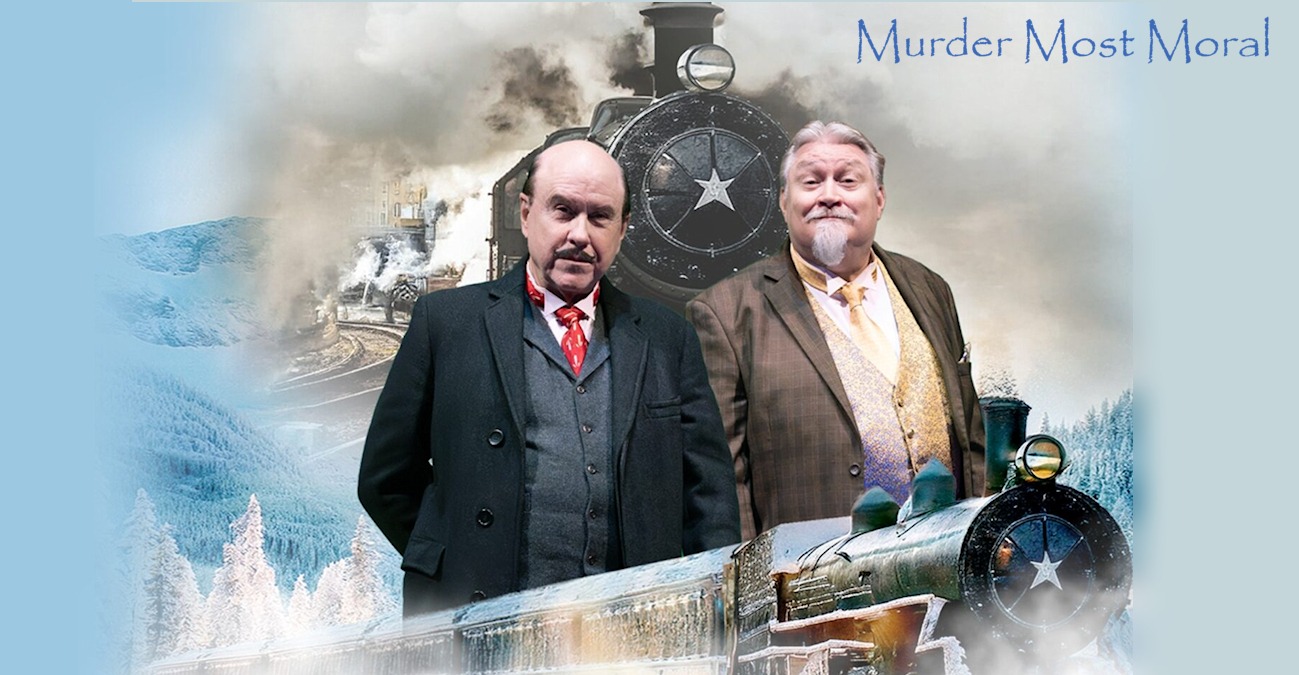Agatha Christie’s Murder on the Orient Express starring John Serembe as Hercule Poirot, and Russ Holm as Monsieur Bouc, directed by Scott Nolte.
“Orient Express” director Scott Nolte loves a good mystery, but loves a good moral quandary even more.

It’s autumn, and time for a classic whodunnit — and you don’t get more classic than Agatha Christie. What most people enjoy about her mysteries are the ingenious plots, the wickedly complicated alibis and ruses, and of course the eccentric detectives — brittle but brilliant Mrs. Marple, delightfully dippy Tommy and Tuppence, and the “little grey cells’ of that Belgian prodigy, Monsieur Hercule Poirot.
But for director Scott Nolte, who’s helming Harlequin’s production of Murder on the Orient Express, what’s most enjoyable is a mystery with some moral depth and a sleuth who’s also an agent of ethical justice. “For a detective of the Golden Age like Poirot, things were much more black and white, and it was troubling when they had to color outside the lines,” says Nolte. “When that divide is threatened or they’re asked for compromise, the detective is often deeply morally offended.”
It’s not surprising that as a director, Nolte is focusing on a classic murder mystery’s serious moral issues. While Olympia audiences may only know him from directing Building Madness at Harlequin two years ago, from 1976 to 2020 he was the founding artistic director of Seattle’s Taproot Theatre, a “Theatre of Faith” (the faith being Christian) which grew from a nomad company of SPU grads to a well-respected professional theatre, balancing popular tastes with scripts generally carrying a significant moral component. (For evidence of their success, visit their current home in a jewelbox theatre in Greenwood, which further expanded to a second black box space and cafe under Nolte’s leadership.)
It was J.B. Priestley’s An Inspector Calls, which first brought Nolte as a director to the mystery genre. Priestley’s play is a fierce indictment of the pre-World War II bourgeoisie presented in the form of a classic mystery, with a police detective appearing uninvited at the engagement party of an upper-class family to inquire into the death of a young woman. “As he interviews the family, it turns out that every one of them knew her,” explains Nolte, “and though no one was directly responsible for her death, they had all contributed to her despair.” As a study in the responsibilities of individuals to a society and what our moral core is, he saw that detective stories could be about more than the body in the library and elaborate alibis.

He went on to direct two Lord Peter Wimsey adaptations and the classic thriller Wait Until Dark (coming up at Harlequin next January, directed by Artistic Director Aaron Lamb), along with a smattering of other mysteries, but Orient Express is his first Agatha Christie. “Until very recently, most of her adaptations, including the ones she wrote, had very large casts,” he explains. “Now some of her early work is heading into public domain, and these new adaptations are somewhat pared down and much more manageable in terms of cast size.”
Prior to rehearsals, Nolte revisited both Christie and several other writers of the Golden Age, and calls attention to the other element of the stories he enjoys most, their detailed craftsmanship. With a chuckle, he recounts the “Ten Commandments of Mystery Writing” by the Detection Club, a collection of British crime novelists who included Christie, G. K. Chesterton, and Dorothy Sayers. “Some of the rules are funny — you can’t have twins, you can only have one secret passage. But these writers had serious concerns about the quality of thought that goes into writing mysteries, and they wanted to encourage authors to play fair with the readers. You have to respect that, so the reader could fairly deduce the actual solution by themselves.” In a sense, it’s another example of a moral issue wrapped up in the mystery genre: we expect a writer of detective fiction to play fair with us.
Does this production play fair with its audience? Nolte admits more than a few of his audience members will know the answer to the mystery. “It’s a well-known story. Along with the book, there are three different film versions, and a television version, and a video game, and the play. So that limits how you can control the audience’s understanding. We know Poirot, we may know the ending, so it’s a challenge to overcome, to see if you can get them wondering if maybe this time it ends differently. How can we play with their imagination and their memory?”

Whether or not you know the identity of the killer, there’s always the fun of a whodunnit well-done. Here Nolte reads from a list of advice from Fredrick Knott, the author of Dial M for Murder and Wait Until Dark, about what a good stage mystery has to manage — an element of comedy, a deeply visceral moment of shock, the control of tension and release, “the same things you’ll see in a good adventure film like Indiana Jones or Jaws. Finally, ‘the resolution of the mystery can’t be too tightly done. It’s best to have an audience that is ready to argue about it on the way home.’ This is a great story for having an edge of moral dilemma: what does justice look like? I think that’s a message that’s relevant to our time. And it should make for some good conversation.”
WHAT:
Agatha Christie’s Murder on the Orient Express
WHEN:
Friday, Oct. 3 to Sunday, Nov. 2
WHERE:
Harlequin Productions, State Theatre, 202 4th Avenue E, Olympia
TICKETS:
$33-$48
LEARN MORE:
https://harlequinproductions.org/
(360) 786-0151

